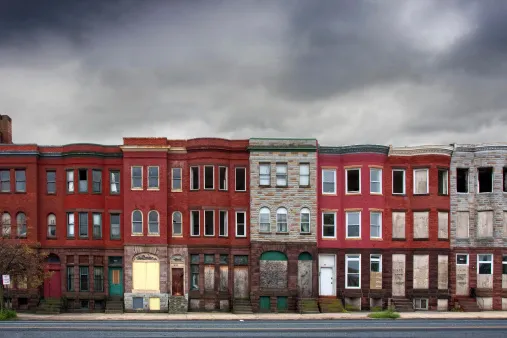Politics
Congress rolls out ‘Better Deal,’ new economic agenda
Congressional Democrats launch a bold economic plan focused on jobs, wages, and corporate reform.

In a bold move to reframe the national conversation around economic inequality and worker rights, Congressional Democrats have officially rolled out “A Better Deal”, a sweeping policy agenda that aims to reshape the American economy from the ground up. Introduced as a direct response to growing public frustration over wage stagnation, corporate consolidation, and the rising cost of living, the plan outlines a series of proposals designed to empower workers, lower household expenses, and challenge entrenched corporate interests.
Unveiled at a press event in the working-class town of Berryville, Virginia, the initiative marks a strategic shift for the Democratic Party. After struggling to articulate a cohesive economic message in past election cycles, party leaders are now doubling down on populist themes — borrowing from both progressive and centrist traditions in an attempt to build a broad coalition. Senate Majority Leader Chuck Schumer described the plan as “not just a better slogan, but a better deal for American families who feel left behind by both Wall Street and Washington.”
Key pillars of the “Better Deal” include:
-
Raising Wages and Creating Jobs: The plan calls for a $1 trillion infrastructure investment package designed to create millions of well-paying jobs, especially in construction, clean energy, and public transportation. It also includes tax incentives for companies that hire U.S. workers at fair wages.
-
Lowering the Cost of Living: Democrats are proposing stronger oversight of prescription drug pricing, a cap on out-of-pocket medication costs for seniors, and new rules to prevent corporations from inflating consumer prices through monopolistic practices.
-
Cracking Down on Corporate Monopolies: Perhaps the most aggressive element of the platform, this initiative targets anti-competitive behavior by large tech companies, pharmaceutical giants, and agribusiness conglomerates. Lawmakers say they will push to expand antitrust enforcement powers and close loopholes that allow companies to suppress wages and crush small business competitors.
-
Workplace Fairness and Training: The agenda promises a national apprenticeship initiative, protections for gig economy workers, and support for collective bargaining rights. It also includes proposals to expand paid family leave and ensure equal pay across gender and racial lines.
While the “Better Deal” is unlikely to become law without broader bipartisan support, it represents a significant ideological shift — one that prioritizes working-class concerns in a political climate often dominated by elite interests. The plan has drawn comparisons to FDR’s New Deal and even echoes aspects of Bernie Sanders’ progressive platform, although party leaders have emphasized that this is a “pragmatic, achievable” set of reforms.
Reaction from across the political spectrum has been mixed. Business groups have expressed concern about potential overregulation and its impact on innovation. Republicans, meanwhile, dismissed the proposal as “old ideas in new packaging,” arguing that tax reform and deregulation — not increased federal spending — are the keys to growth. However, early polling suggests the core ideas behind “A Better Deal” are resonating with a wide swath of Americans, especially independents and younger voters.
Political analysts view the rollout as both a legislative strategy and a campaign blueprint heading into the next election cycle. With the midterms on the horizon, Democrats are betting that a laser focus on kitchen-table economics will be the key to winning back swing voters — many of whom feel increasingly disconnected from both parties.
As the details of “A Better Deal” continue to unfold in congressional hearings and public forums, one thing is clear: the battle over the future of the U.S. economy is just getting started, and lawmakers are now being forced to answer a critical question — who is the economy really working for?
Politics
Floating Solar Farms Could Power Millions by 2030
Harnessing Sun and Water for a Greener Tomorrow

Countries like China and the Netherlands are investing in floating solar farms—panels installed on lakes and reservoirs—to combat land scarcity. These farms generate clean energy while reducing water evaporation by up to 70%. A single project in Singapore now powers 5,000 homes, and global capacity is expected to triple by 2030.
Experts highlight added benefits: the water cools panels, boosting efficiency by 10%, and the tech avoids ecosystem disruption caused by land-based farms. With climate goals looming, floating solar could be a game-changer for energy-hungry nations.
Politics
Ruth Bader Ginsburg optimistic ‘over the long haul’ for US
Ruth Bader Ginsburg remains optimistic about the future of the United States, emphasizing the importance of long-term progress and the ongoing pursuit of justice despite current challenges.

In a recent statement that has inspired hope across the nation, Supreme Court Justice Ruth Bader Ginsburg expressed her optimism about the future of the United States, despite the current political and social challenges. Known for her resilience and sharp legal mind, Ginsburg shared her belief that the country would ultimately overcome its obstacles, focusing on the importance of patience and long-term progress. Reflecting on her own lengthy career, Ginsburg emphasized the importance of enduring through difficult times and working toward meaningful change, no matter how slow or incremental it may appear. Her optimistic outlook is a reminder that while immediate outcomes may be frustrating, the ongoing efforts of individuals and institutions can lead to significant transformation over time.
Justice Ginsburg’s comments come at a time when the nation faces deep divisions on issues such as healthcare, civil rights, and the political landscape. Yet, Ginsburg, who has become an icon for legal advocacy and women’s rights, remains steadfast in her belief that the country’s core values of equality, justice, and liberty will prevail. In her view, the legal system, though not perfect, is still a powerful tool for creating long-lasting societal change. She encourages the younger generations to stay engaged and to push for reforms, even when progress seems slow. Ginsburg’s optimism is grounded in her own experiences, where her tireless efforts for gender equality and civil rights were often met with resistance but ultimately led to groundbreaking legal victories.
Her words have resonated deeply with many, especially in an era where many people feel frustrated by the pace of political change. Ginsburg has long been a figure of strength for those fighting for justice, and her enduring presence on the Supreme Court has symbolized hope for progress in even the most uncertain times. Her legacy of advancing civil liberties and gender equality continues to inspire future generations of activists, lawyers, and ordinary citizens working toward a fairer society.
Despite her health challenges in recent years, Ginsburg remains committed to her role, demonstrating an unmatched dedication to her work and the values she upholds. Her belief in the strength of democratic institutions and the importance of perseverance has led many to look to her as a beacon of hope during difficult times. Her remarks offer a sense of reassurance that, though the road ahead may be difficult, the fight for justice is far from over, and positive change is possible with sustained effort.
Ginsburg’s optimism is a reminder that while the current moment may feel overwhelming, the United States has faced many challenges throughout its history—and has always found a way to move forward. It is her belief that, through persistence, collective action, and the continued pursuit of justice, the nation will continue to progress toward a more inclusive and equitable future.
Politics
Mayors agree, Congress should invest in affordable housing
Mayors across the U.S. are urging Congress to address the housing crisis with major federal investment.

In a rare show of bipartisan unity, mayors from across the United States are calling on Congress to make a bold and immediate investment in affordable housing, describing the issue as a national emergency that affects every corner of the country — from bustling cities to rural towns. At a recent summit hosted by the U.S. Conference of Mayors, over 150 city leaders signed a joint letter urging lawmakers to prioritize affordable housing in the upcoming federal budget, arguing that failure to act now will only deepen the existing crisis.
The mayors’ appeal comes amid a record shortage of affordable homes. According to the National Low Income Housing Coalition, the U.S. is facing a shortfall of more than 7 million affordable rental units for extremely low-income families. Rents have surged over the past five years, home prices have soared, and wage growth has not kept pace — creating a widening affordability gap that local governments say they simply cannot solve on their own.
“This isn’t just a housing issue — it’s a public health issue, an education issue, an economic issue,” said Kansas City Mayor Quinton Lucas during the summit. “If families are spending 50, 60, sometimes 70 percent of their income on rent, how can they afford food, transportation, or child care? We need Congress to step up.”
The mayors are specifically urging Congress to increase funding for the Housing Choice Voucher program, expand the Low-Income Housing Tax Credit (LIHTC), and support President Biden’s proposed $10 billion Affordable Housing Investment Fund. Many are also advocating for policies that address zoning reform, which they argue could unlock private sector development of lower-cost units in areas traditionally resistant to denser housing.
What’s notable is that both Democratic and Republican mayors have joined the call, highlighting how housing unaffordability is now a nonpartisan concern. Republican Mayor Jerry Dyer of Fresno, California, stressed that his city’s housing crisis “transcends ideology,” adding that “when people can’t afford to live in the community where they work, it hurts our entire local economy.”
Meanwhile, housing advocates are seizing on the moment to push for long-term structural changes. Organizations like Habitat for Humanity and the Urban Institute have proposed national strategies that include building more units, improving rental assistance, and supporting first-time homebuyers. They argue that simply subsidizing rents isn’t enough; the U.S. must increase supply, reduce regulatory barriers, and invest in community infrastructure.
Despite broad support from mayors and housing advocates, action in Congress remains uncertain. Lawmakers remain divided over how much to spend, and some express concern about inflationary pressures and the national debt. But with homelessness rising in major metro areas and housing insecurity now affecting even middle-income earners, political pressure is mounting.
“This is the moment,” said Mayor Michelle Wu of Boston. “The cost of inaction is far greater than the cost of building homes. Every day we wait, more families fall into crisis.”
As Congress prepares for its next budget cycle, mayors hope their unified voice will tip the scales. Whether that unity translates into legislation — and shovels in the ground — remains to be seen, but one thing is clear: America’s housing crisis can no longer be ignored.
-

 Fashion6 months ago
Fashion6 months agoMove Over, Stanley Cups – This Insanely Aesthetic (and Leak-Proof) ‘It’ Water Bottle Is Suddenly All Over Your Feed
-

 Entertainment8 months ago
Entertainment8 months agoThe final 6 ‘Game of Thrones’ episodes might feel like a full season
-

 Fashion5 months ago
Fashion5 months agoKim Miso: Morocco’s Cultural Ambassador Shaping Korea’s Fashion and Music Scene
-

 Fashion5 months ago
Fashion5 months agoAddison Rae’s Y2K Revival: Nostalgia Meets New-Age Glam
-

 Fashion6 months ago
Fashion6 months agoFashion Artists Are Taking Over: New Wave Designers Drop Unfiltered Collections
-

 Fashion7 months ago
Fashion7 months agoMaison Yoshiki Paris SS25: A Symphony of Lightness and Artistry
-

 Fashion6 months ago
Fashion6 months agoHailey Bieber’s Timepiece Triumph: A Dress That Ticks All the Boxes
-

 Tech6 months ago
Tech6 months agoAgentic AI Takes Over: Your New Co-Worker is a Self-Learning Algorithm














